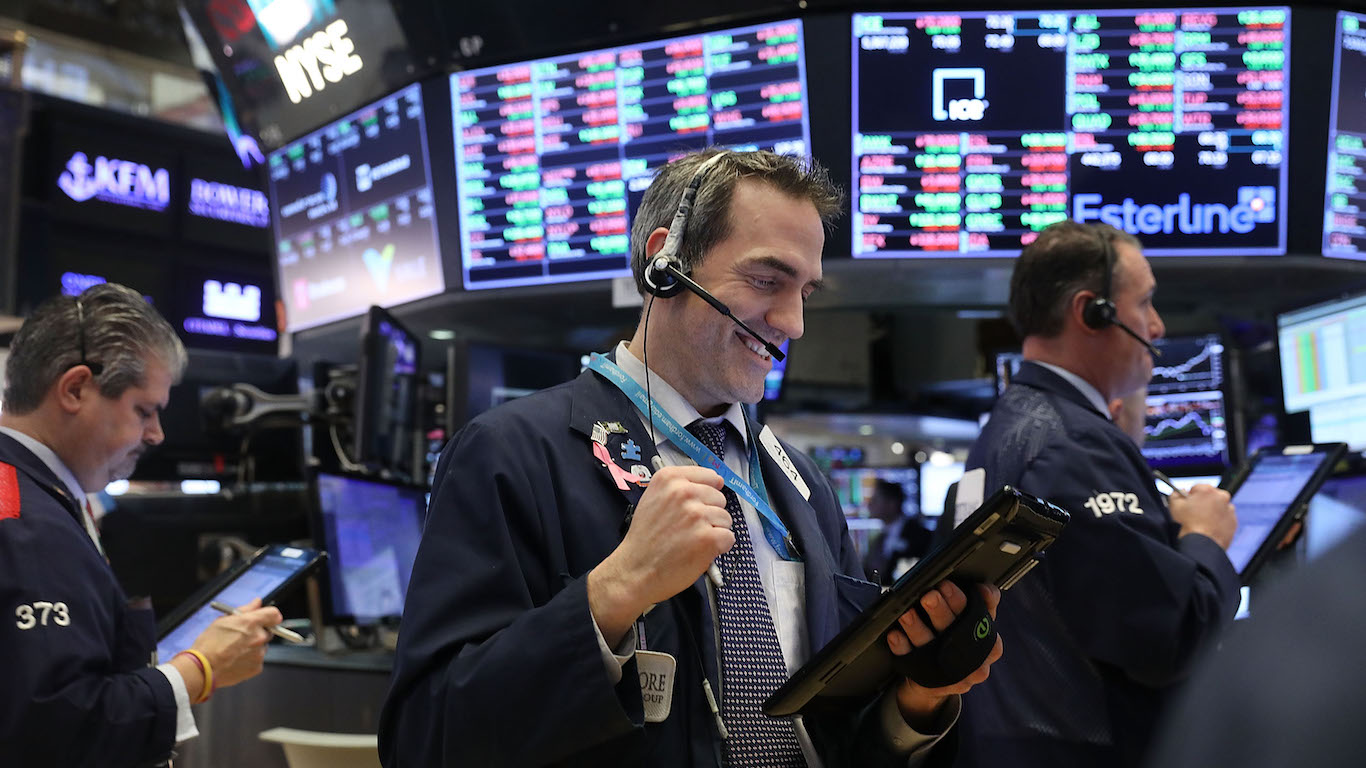
It takes a certain kind of courage to short sell blue chips, such as the Dow Jones industrial average components. Short sellers are betting on these companies to fail, or at least for their share prices to fall handily. Plus, those sellers are responsible for paying the dividends on the stocks they short.
Maybe it is little wonder that only three of the 30 Dow stocks had notable short interest between March 29 and April 15; that is, more than 50 million shares short. In fact, just six of them had short interest of more than 30 million shares.
Yet the bull market is quite long in the tooth — now more than 10 years old — and concern about a coming recession is rising. Investors may wonder then what the short sellers expect from some of the biggest, most well-respected names on Wall Street.
As of the April 15 settlement date, the most recently reported period, short sellers still favored Pfizer Inc. (NYSE: PFE), Apple Inc. (NASDAQ: AAPL) and Intel Corp. (NASDAQ: INTC) above all other Dow stocks.
Pfizer
> Shares short: 65.04 million
> Change from prior period: −18.6%
> Percentage of float: 1.2
This is the fourth double-digit percentage decline in a row, as short interest retreats after the almost 265% rise in early January to the greatest number of shares short at Pfizer so far this year. Another sharp drop may allow Apple to reclaim the top spot. And at the daily average volume on the most recent settlement date, it would take about four days for Pfizer short sellers to cover their positions.
Pfizer is among the 24/7 Wall St. recommended dividend stocks for retirees to own. By the end of the first two weeks of April, the share price had retreated less than 2%, while the Dow had gained less than 2% during the short interest period. The stock continued its pullback afterward.
Shares closed Thursday’s trading at $39.61 apiece, more than 1% higher than a week ago. Pfizer’s 52-week low of $34.37 was seen last spring, and the 52-week high of $46.47 was from this past December. The stock now is down about 9% since the beginning of the year.
Apple
> Shares short: 61.00 million
> Change from prior period: −10.0%
> Percentage of float: 1.3
Note that this was down from a year-to-date high of almost 97 million Apple shares short at the end of February and that the average daily trading volume dropped sharply during the first two weeks of this month. By the most recent settlement date, the number of days it would take for investors to cover all their short positions rose to more than two.
At least one analyst remained cautious on the stock during the period, anticipating further downside ahead. But short sellers watched the share price rise more than 6% yet then end the most recent settlement date with a gain of less than 5%. The Nasdaq saw a gain of almost 3% during those two weeks.
After increasing less than 1% in the past week, Apple stock ended trading most recently at $205.28 a share. That was in a 52-week range of $142.00 (at the beginning of this year) to $233.47 (last October). The share price currently is about 30% higher year to date.
Intel
> Shares short: 52.10 million
> Change from prior period: −3.4%
> Percentage of float: 1.2
This was on top of a more than 5% decline in the previous period and now is the lowest short interest in at least a year. Note that the average daily trading volume also fell to a 52-week low, and as of the middle of this month, it would take more than three days for investors to cover all their short positions.
Expected lower demand and increased competition were the drivers behind an analyst downgrade of Intel during the period. However, the April 15 closing share price was more than 4% higher than on the previous settlement date, much of that gain coming early in the period. The S&P 500 rose around 2% or so in the initial half of the month.
Intel was last seen trading at $57.61 a share, down modestly from the recent multiyear high of $59.59. The 52-week low is $42.36 per share. And the latest share price is more than 22% higher than at the beginning of the year, which is about the same as the Nasdaq but better than the Dow.
And the Rest
Rounding out the top six most shorted Dow stocks on the most recent settlement date were Microsoft Corp. (NASDAQ: MSFT), Cisco Systems Inc. (NASDAQ: CSCO) and Exxon Mobil Corp. (NYSE: XOM). In all three, fewer shares were sold short by the end of the period, a time when their share prices were on the rise. In fact, Cisco and Microsoft each have seen a recent 52-week high, with Cisco the best-performing Dow stock during the period as well.
Also notice on the full list of the Dow stocks ranked by number of shares short as of April 15 that the clear trend was shrinking short interest in the first two weeks of this month, with notably Disney and Walgreens bucking that trend:
| Dow Stock | Short (millions) | Change | % Float |
|---|---|---|---|
| Pfizer | 65.04 | −18.6% | 1.2% |
| Apple | 61.00 | −10.0% | 1.3% |
| Intel | 52.10 | −3.4% | 1.2% |
| Microsoft | 42.92 | −6.6% | 0.6% |
| Cisco | 39.64 | −6.1% | 0.9% |
| Exxon | 36.63 | −7.3% | 0.9% |
| Visa | 28.43 | −5.4% | 1.6% |
| Verizon | 28.06 | −27.4% | 0.7% |
| Walgreens | 26.88 | 14.4% | 3.4% |
| Merck | 22.31 | −31.6% | 0.9% |
| Coca-Cola | 22.17 | −9.6% | 0.5% |
| Procter & Gamble | 20.99 | −8.0% | 0.8% |
| JPMorgan | 18.88 | 7.3% | 0.6% |
| Chevron | 17.01 | −1.0% | 0.9% |
| Walmart | 16.32 | −1.2% | 1.2% |
| IBM | 14.30 | −2.3% | 1.6% |
| Disney | 13.98 | −0.0% | 0.8% |
| Johnson & Johnson | 11.24 | −8.4% | 0.4% |
| Home Depot | 9.61 | −0.0% | 0.9% |
| Nike | 9.51 | −13.3% | 0.8% |
| 3M | 9.25 | −7.6% | 1.6% |
| Dow | 7.77 | n/a | 1.0% |
| United Technologies | 7.46 | −1.9% | 0.9% |
| American Express | 6.45 | −3.8% | 0.8% |
| McDonald’s | 5.88 | −5.0% | 0.8% |
| Caterpillar | 5.87 | −6.11% | 1.0% |
| Goldman Sachs | 5.86 | 7.8% | 1.7% |
| UnitedHealth | 5.58 | −14.3% | 0.6% |
| Boeing | 5.34 | 5.4% | 0.9% |
| Travelers | 3.83 | −0.7% | 1.5% |
Travel Cards Are Getting Too Good To Ignore (sponsored)
Credit card companies are pulling out all the stops, with the issuers are offering insane travel rewards and perks.
We’re talking huge sign-up bonuses, points on every purchase, and benefits like lounge access, travel credits, and free hotel nights. For travelers, these rewards can add up to thousands of dollars in flights, upgrades, and luxury experiences every year.
It’s like getting paid to travel — and it’s available to qualified borrowers who know where to look.
We’ve rounded up some of the best travel credit cards on the market. Click here to see the list. Don’t miss these offers — they won’t be this good forever.
Thank you for reading! Have some feedback for us?
Contact the 24/7 Wall St. editorial team.

 24/7 Wall St.
24/7 Wall St.



